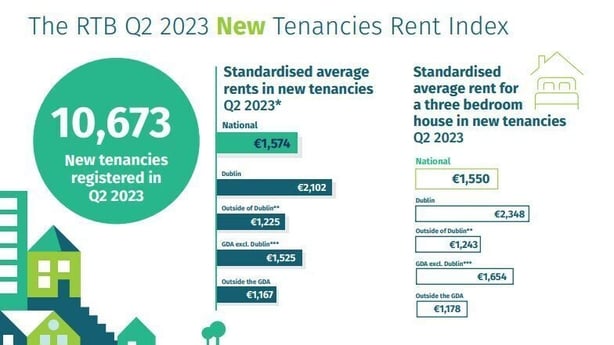New tenants are paying considerably more rent than renters with existing tenancies, new official data has shown for the first time.
According to information released by the Residential Tenancies Board, the standardised average rent nationally for an existing tenancy between April and June of this year was €1,332.
That compares to €1,574 for a new tenancy, a difference of 18.2%.
The data also show that rents being paid by existing tenants are rising at a slower pace than those faced by new tenants.
Rents for existing tenancies grew by just 5.3% compared to the same quarter last year, and 1.1% compared to the previous three-months.
However, rents for new tenancies rose by a record 11.6% between April and June, compared to the same three months last year, while versus the first quarter of this year they were up 5.2%.
The comparison between new and existing tenancies has been made possible by the introduction last year of a requirement for tenancies to be registered on an annual basis, which means rents for existing tenancies as well as new ones are now being captured for the first time.
"The production of an index that can track rent developments in all rents across the private rental sector is a major step forward," said Director of the RTB, Niall Byrne.
"Information is now available for sitting tenants which was not available in the previous Rent Index Reports."
"The RTB, in conjunction with the ESRI, is committed to publishing, and further developing, the new tenancy and existing tenancy rent indices."
"Over time, these indices will provide strong evidence and deeper insights into the private rental sector for the benefit of policymakers and the public."
He added that the extra new data will help the RTB to fulfill its obligations of ensuring compliance and enforcement with rental rules.
As a result of the ongoing increase in rents, the Government has designated the Shannon Local Electoral Area and the Administrative Area of Westmeath County Council as Rent Pressure Zones (RPZs) from today onwards.
This limits rent increases in the affected areas to 2% a year by law.

The data shows that there were 10,673 new tenancies registered in the second quarter of the year, down from 16,155 during the same quarter last year.
In Dublin, the standardised average monthly rent for a new tenancy was up 10% year-on-year to €2,102, compared to €1,225 outside of the capital, where it climbed by 11.7%.
In the Greater Dublin Area (GDA) excluding Dublin itself, the average standardised rent for a new tenancy was €1,525, up 11.5% on the same period in 2022, while outside the GDA, it was €1,167, an increase of 11%.
County Dublin saw the highest average monthly rent during the quarter at €2,102, while County Leitrim recorded the lowest, at €879.
On an annualised basis, the lowest growth in the standardised average rent in new tenancies in the period was in Laois and Waterford, where new tenancy rents grew by 8.3% and the highest was in Longford, at 27.4%.
Twenty counties had annualised growth in new tenancy rents above 10%.
35,888 existing tenancies were renewed over the three-month period.

The standardised average monthly rent for these renewals in Dublin was €1,767, up 5.5% year on year, while outside of Dublin it was €1,018, a rise of 4.7%.
In the GDA excluding Dublin, it was €1,288 having climbed 2.6% over the year, while outside the GDA it was €973, up 5.4%.
Nationally 26.8% of new tenancy rents were over €2,000, compared to 13.5% of rents for existing tenancies.
Sinn Féin's Pearse Doherty has told Leaders' Questions in the Dáil that the Government does not care about renters.
He said that the housing crisis is deepening for renters and the Government must now ban rent increases.
Responding, Tánaiste Micheál Martin said increasing the supply of housing has to be the solution.
Housing was the key social issued facing the country, he said.
Mr Martin said banning rent increases will reduce the supply of houses and rents would rise further. He said Sinn Féin's policy would make things even worse.
Mr Doherty described the Tánaiste comments as "delusional".
Sinn Féin's Pearse Doherty said that the Govt does not care about renters and that the average rent was now €1,600. The Tánaiste said increasing the supply of housing has to be the solution and action was under way to do so | https://t.co/s7vMR2tKhm pic.twitter.com/gd1ExaSvNA
— RTÉ News (@rtenews) November 30, 2023
Mr Martin also accused the Social Democrats leader Holly Cairns of offering "precious little" in terms of solutions to the housing crisis.
Ms Cairns told the Dáil that the Government had overseen continued rent hikes since it took office and she accused them of gaslighting the nation, by trying to tell people that "this failure is a success".
She said that that landlords were ignoring rent cap rules and called for a freeze on rent increases for three years, the re-introduction of a ban on no-fault evictions and for a rent register to ensure that there is transparency around rents.
However, Mr Martin said that freezing rents would reduce housing supply and actually lead to further increases in rents.
Housing charity Threshold said it was alarming to see the large difference in average rents for new tenancies compared to existing ones.
It said rent increase can impact the difficult choices a person may face with affording everyday living costs.
The organisation added that the report does not provide data on non-compliance with the rent regulations, but based on the figures, it is likely that some landlords take the opportunity to increase rents at the turnover of a tenancy, whether lawfully permitted to do so or not.
As a result it called for the establishment of a dwelling specific rent register that provides accurate information on affordability of homes in the private rental sector.






